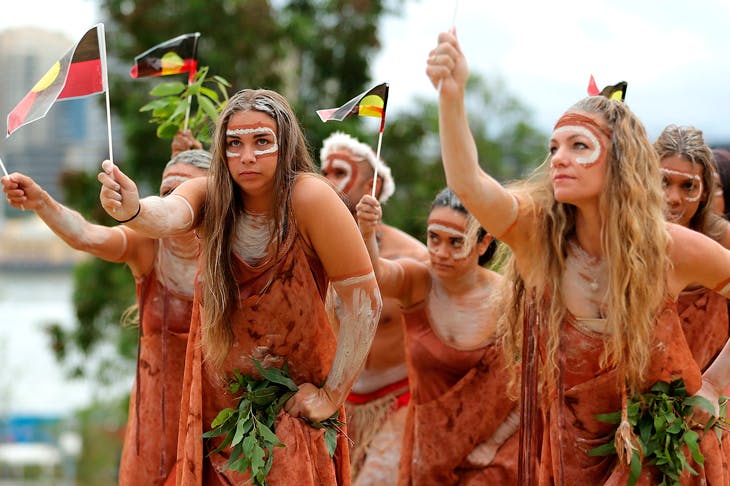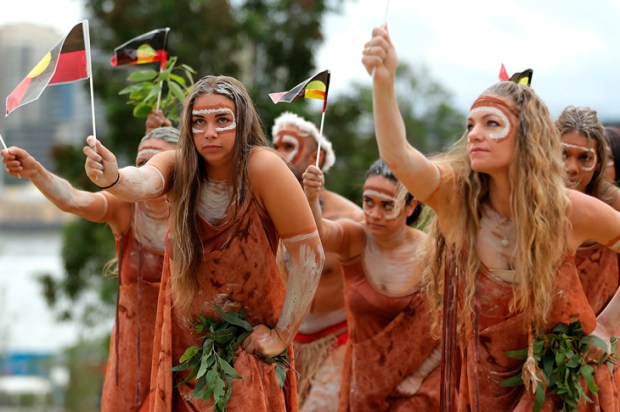I acknowledge the Aboriginal peoples who are the Traditional Custodians of the land on which I live. I pay my respects to their elders past, present and future, and acknowledge Aboriginal peoples are hurting and mourning on this day. I also acknowledge that Aboriginal peoples have a strong spirit of survival, having survived for over 60,000 years.
Such was the wording well-meaning people were encouraged to post on their facebook page on Australia Day. Anyone familiar with state school assemblies will immediately recognise this form of words as an Acknowledgment of Country which is the trendy indigenous thing trendy non-indigenous teachers insist upon when they can’t find an aboriginal person to conduct the more prestigious Welcome to Country. The latter is the ideal, as it absolves the white participants of any blame for the invasion of 26 Jan, 1788. ‘Sure, my bigoted British ancestors committed genocide against the pacific people of the Eora nation, but I was invited!’ A good Welcome to Country covers over a multitude of sins.
Even some proponents of Welcomes to and Acknowledgements of Country admit that they’re recent innovations. Not that I begrudge any aboriginal go-getters who might take advantage of these officially sanctioned money-making schemes.And money-making they certainly are with some ‘service providers’ offering to travel anywhere in New South Wales (despite there being many First Peoples nations and tribes within the state borders) to conduct a ceremony as simple or as elaborate as the school/charity/university/government department/ company would like. There is, naturally, a ‘call-out fee’ payable, and dancers, etc can also be arranged. One government website provides a list of elders who are endorsed by the local United Elders Council, who would be happy to co-ordinate the simple or elaborate service, together with the caveat that, should an approved elder not be available, a family member can, conveniently, be deputised for the event. And when the venerable elders, or their second cousins, are not welcoming whitefellas to their country (or to someone else’s)? Why, they’re consulting, of course, on how the guilt-stricken westerner can save time and money in the future and do the more modest acknowledgments himself.
Now while we’re used to this kind of taxpayer-funded indulgences at civic functions and on work time, this was the first time I had seen a concerted and organised effort to have this vain nonsense plastered across social media. And there’s no better time to do it than Australia Day. How patriotic! But what does it actually mean? The truth is, I’m not sure.
For starters, the whole idea of an acknowledgement is ridiculous, especially when it’s now required at every possible public or private event. In my more generous moments I can perhaps see why some sort of acknowledgment might be appropriate at, say, the opening of a major new public facility, or at a graduation ceremony for aboriginal students. But as the ACT government’s dedicated website makes clear, acknowledgement of the ‘traditional custodians’ must occur ‘in all ACT government programs, services, legislation and activities’ (emphasis in original). Can they not see that perfunctory acknowledgements devalue those times when genuine acknowledgment would be appropriate? But acknowledge we must! So what are we acknowledging?
It’s the traditional custodianship, stupid. But again, what are we meant to understand by those terms? Both are weasel words: ‘traditional’ doesn’t mean previous; in fact it deliberately allows for continuity. ‘Custodian’ implies rights over something of which you are not the owner. Property ownership cases have turned on far less.
And then there’s the payment of respect to elders past, present, and future. One cynical aboriginal friend explained the intra-tribal power struggles that go on to become a government-accredited elder. Frauds and charlatans, another indigenous friend said. In my church we have elders who are elected by the congregation and have jurisdiction within that group. At their ordination it’s the congregation (who chose them) that stands up and promises to, essentially, pay them respect. It’s a voluntary arrangement that applies within a specific context. Not so ‘their elders past, present and future’. Every right thinking Australian is coerced to honour them, even the dead ones, and those yet unborn!
But time for another acknowledgement. This time, that ‘aboriginal peoples are hurting and mourning on this day’. Some, but not all, certainly are, and there are times and places to acknowledge that painful truth. My Oz Day facebook feed in between an hilarious ABC interview with a proud Darwin bogan (Google it – I guarantee it will make you feel better after reading my depressing little piece) and pictures of my own kids in kitsch Australiana is probably not that time or place.
How about a real discussion about what should be our national shame? Not Invasion Day social media memes, but an actual conversation about why aboriginal people are on the wrong side of statistics around literacy, health, drug abuse, family violence, child neglect, life expectancy, incarceration, high school attendance and completion, university admission, and not just ‘on this day’ either. But enough with the details, right? Why spoil a national day of gratuitous pronouncements with specifics, or with any nuance about who’s mourning and why some aboriginal people are not?
According to the how-to-acknowledge-country websites, it’s best not to make your grandstanding too long. And so it concludes on a rather upbeat, if somewhat patronising, note with an ‘also acknowledge’ about the Aboriginal peoples’ ‘strong spirit of survival’. It all sounds like a script from Lassie; she’s caught in a bear trap in the middle of winter but… she has a strong spirit of survival.
But so do the Jews. And the Armenians. And if anglo-saxon hegemony and privilege is as self-evident as the Australia Day social media activists claim, my people must have a pretty decent spirit of survival as well. But what the purveyors of victimhood call ‘survival’ most of us just call ‘life’. Some people have done it tough, and some, like me, have had it pretty easy.However, when identity politics combines with a competitive victimhood, it encourages the self-serving acknowledgements above, and it precludes real change and action in the lives of the poorest and most disadvantaged in our society. How sad that, on our national day of all days, rather than progress for indigenous people, we have condemned them to being the object of our vanity facebook posts and other grand but meaningless gestures.
Got something to add? Join the discussion and comment below.
Get 10 issues for just $10
Subscribe to The Spectator Australia today for the next 10 magazine issues, plus full online access, for just $10.














Comments
Don't miss out
Join the conversation with other Spectator Australia readers. Subscribe to leave a comment.
SUBSCRIBEAlready a subscriber? Log in